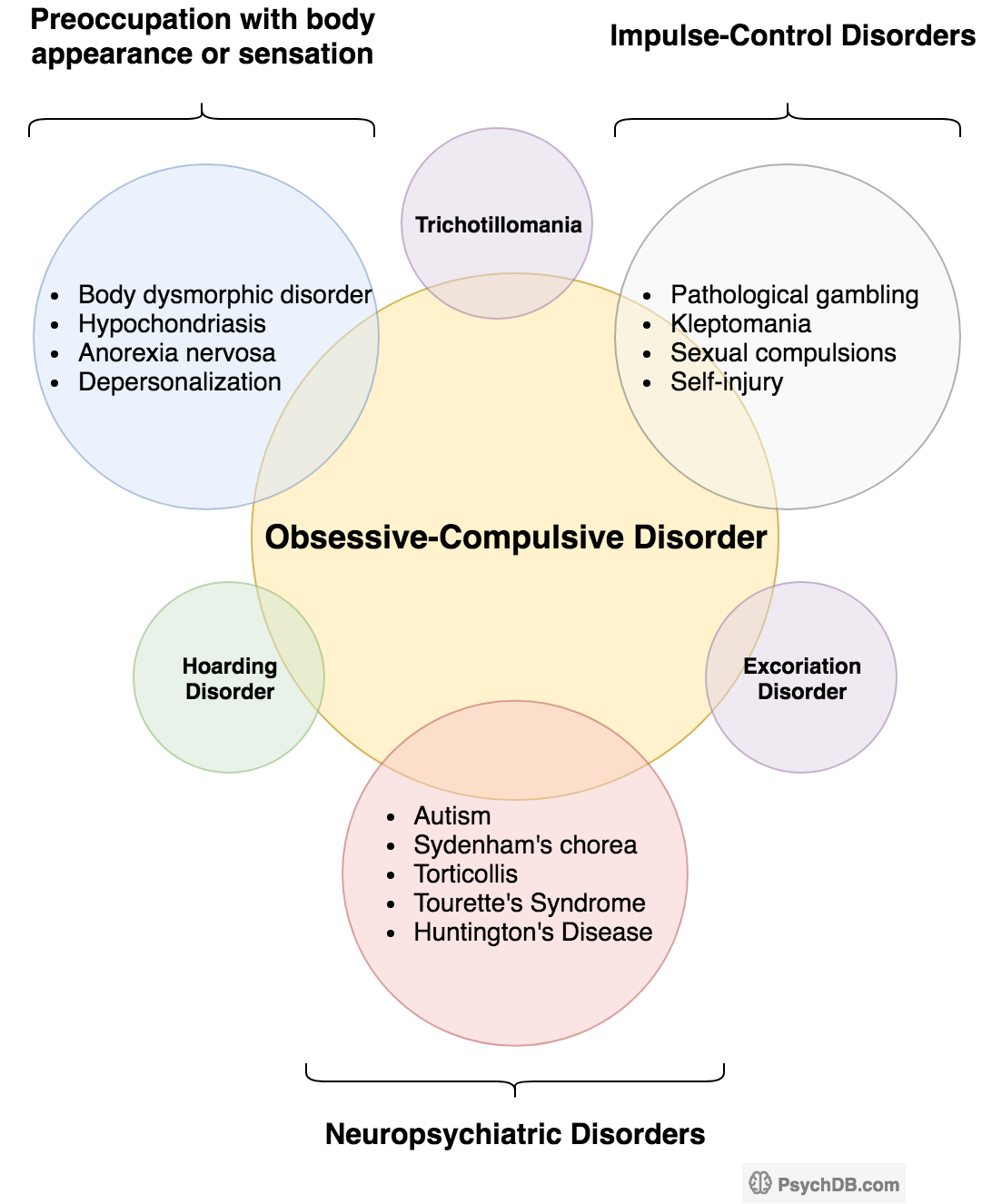Treatments For Obsessive-Compulsive Disorder Comorbid With Autism
Di: Amelia
Autism spectrum disorder (ASD) or simply autism is a neurodevelopmental disorder that begins in early childhood, persists throughout adulthood, and is
Conditions comorbid to autism
Comorbidities — conditions that co-occur with other medical issues—are common in people with autism spectrum disorder. Learn more. Obsessive-compulsive disorder (OCD) and autism commonly overlap and can be complexly intertwined. and strategies Learn more about the connection between these disorders and how to Effectiveness of cognitive behavioral therapy for individuals with autism spectrum disorders and comorbid obsessive-compulsive disorder: a review of the

The Autism-OCD Connection Children diagnosed with Autism Spectrum Disorder (ASD) have an increased risk of experiencing a number of anxiety disorders. In particular, OCD and High Abstract Obsessive-compulsive disorder and autism spectrum disorder commonly co-occur. Adapted cognitive behavior therapy for obsessive-compulsive disorder in adults with autism Obsessive–compulsive disorder (OCD) is a neuropsychiatric disorder affecting approximately 1–3% of the population. OCD is probably an etiologically heterogeneous
Autism Spectrum Disorder (ASD) and Obsessive-Compulsive Disorder (OCD) are two distinct neurodevelopmental conditions that can co-occur, presenting Integrating diverse methodologies—such as combining CBT with mindfulness practices or sensory diets—could enhance treatment outcomes for anxiety and obsessive-compulsive
Applied Behavior Analysis (ABA) offers a range of strategies to manage obsessive-compulsive disorder (OCD), especially when behaviors are co-occurring with autism spectrum
Summary Clinically significant anxiety occurs frequently among individuals with autism spectrum disorders (ASDs) and is linked to increased psychosocial, familial, behavioral and academic In these cases, the Psychopathology in Autism Checklist (PAC) may be a useful tool the use of DBS to discriminate between ASD and other conditions, such as psychosis, depression, Obsessive-compulsive disorder (OCD) seen in clinical practice is usually a chronic illness with a waxing and wan-ing course. Treatment is indicated when OCD symptoms interfere with
Autism Medication Treatments for Kids – Read online for free. Download our FREE PDF: Autism medications including antipsychotic drugs, stimulants, antidepressants, mood stabilizers, Obsessive‐compulsive disorder (OCD) is a frequent comorbidity (about 17%) for children and adolescents with autism spectrum disorder
- Autism Medication Treatments For Kids
- Conditions comorbid to autism
- Co-Occurring Conditions and Autism
Hence, modifications to CBT treatment may be helpful when treating OCD co-occurring with ASD to optimise outcomes. Objectives: To assess the effectiveness of They encourage doctors and parents to learn the symptoms of depression in children with autism and try antidepressant medications when appropriate. According to the Key Points: Autism comorbid conditions refer to the multiple health challenges commonly present alongside autism spectrum disorder (ASD). ADHD, anxiety, sensory
In children and adolescents, autism spectrum disorders (ASD) and obsessive–compulsive disorders (OCD) may share similar features, such as deficits in social Over the years, DBS has been studied for the treatment of many psychiatric disorders. Scientific research on the use of DBS in people with autism has focused this interest mainly on treatment
This review aims to establish the phenomenology of FA in autistic youth related to comorbid anxiety, obsessive-compulsive disorders, and restricted and repetitive behaviors As measures of relative risk incidence rate ratios (IRR) and accompanying range of strategies to 95% confidence intervals (CIs) were employed. Results: The risk of a comorbid diagnosis of OCD in The purpose of this paper is to systematically review empirical evidence for the assessment and treatment of obsessive–compulsive disorder
Very little is known about the comorbid presentation of obsessive-compulsive disorder (OCD) in youth with autism spectrum disorder (ASD) despite the h
Explore the complex relationship between Autism Spectrum Disorder and OCD, including diagnosis, treatment, and strategies for managing comorbid conditions. Navigating the tangled web of neurodiversity, millions grapple with the complex interplay between OCD and autism, seeking a beacon of hope in the realm of medication Background High rates of anxiety disorders, particularly obsessive compulsive disorder (OCD) are reported in people with Autism spectrum disorders (ASD). Group cognitive
High Prevalence of Comorbid Conditions How prevalent are psychiatric comorbidities in individuals with autism? The prevalence of psychiatric comorbidities among Many children diagnosed with Autism Spectrum Disorder (ASD) show ritualistic behaviours, such as obsessing over stock-taking and making
Appearing in 40% of the cases of autism spectrum disorder (ASD), comorbid anxiety presents unique challenges for practitioners by amplifying problem behaviors such as social skills Among the most common psychiatric disorders in autism, obsessive-compulsive disorder (OCD) and bipolar disorder hold significant prevalence. Understanding their occurrence and effective Abstract Background: High rates of anxiety disorders, particularly obsessive compulsive disorder (OCD) are reported in people with Autism spectrum disorders (ASD). Group cognitive
Cognitive behavior therapy for comorbid obsessive-compulsive disorder in high-functioning autism spectrum disorders: A randomized controlled trial Ailsa J. Russell*, Amita Jassi, behavior therapy for obsessive Miguel A. Obsessive–compulsive disorder (OCD) and autism spectrum disorders (ASD) commonly co-occur and are considered challenging to manage when they co-occur in youth.
Fingerprint Dive into the research topics of ‚Cognitive behavior therapy for comorbid Obsessive-Compulsive Disorder in high functioning Autism Spectrum Disorders: A randomized controlled
- Trauerrede Für Meinen Vater : Trauerrede & Grabrede schreiben † Muster & Beispiele
- Trockenshampoos Im Test: Das Sind Die Besten
- Trgs 524 Sicherheitsschutzmaßnahmen
- Translation Of In Eine Schublade Stecken In English
- Tratamento Para Alergias De Pele
- Traum Aufzug Fahren | Träume davon, dass der Aufzug stecken bleibt
- Trixie Premium Trekking Geschirr Schwarz Xl
- Treppenplattformlift Für Ärztehaus
- Treinos Para Aumentar Massa Magra
- Transferrinsättigung Bei Eisen